Bishop Q June 27, 2011
Author: Beach Combing | in : Ancient, Medieval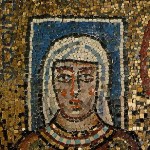
Today a curious Roman marble inscription from Terni in central Italy – not Rome as often reported – that probably dates from towards the end of the Empire, perhaps from the end of the fourth century (Olybrio = consul?). It is an inscription that is so unexpected that it is difficult to know where to […]
Christian Orgies June 22, 2011
Author: Beach Combing | in : Ancient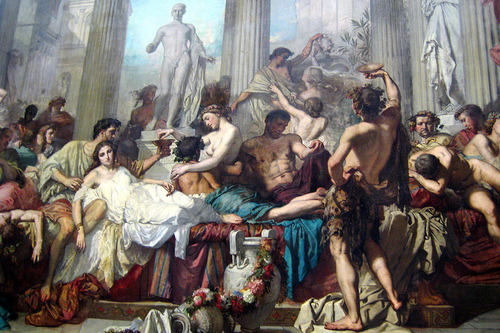
On rainy nights, when the children have gone to bed and Beachcombing wants to provoke his ultra Catholic wife, there is little he loves more than to quote from the following early third-century Christian text, where some of the first pagan criticisms against the upstart religion are aired. As well as describing how Christians eat […]
Druids’ Eggs June 10, 2011
Author: Beach Combing | in : Ancient, Modern
An interesting text from Pliny: (29, 3*) There is also a sort of egg, famous in the provinces of Gaul, but ignored by the Greeks. Innumerable snakes coil themselves into a ball in the summertime. Thus they make it so that it is held together by a bodily secretion and by their saliva. It is […]
Roman Mosaics and Bras in 1930s Leicester June 6, 2011
Author: Beach Combing | in : Ancient, Contemporary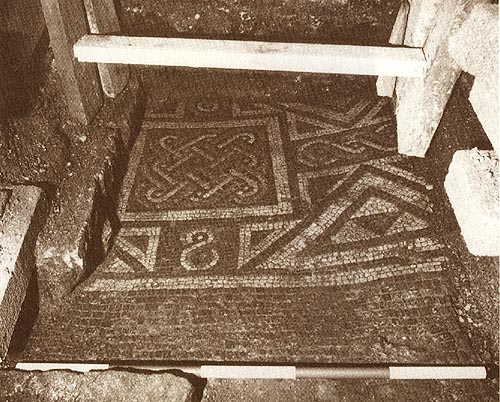
A busy day for Beach today – the hunt for mice, newspaper columns and the ongoing search for an aupair – and so he thought that he would just quote from this 1930s guide to Roman Britain for a strange archaeological visit. Leicester, for those who don’t know it, is a rather frightening English Midland […]
Vampire Mermaids and Migraines May 17, 2011
Author: Beach Combing | in : Ancient, Medieval
A Roman charm from, of all places, Carnuntum in the Alps offers one of the earliest recorded cures for migraine. Written on a piece of silver (and badly eroded) it does not discourse on low-dairy diets or darkened rooms. Rather… Well, Beachcombing will quote from the translated Greek: ‘Antaura came out from the sea. She […]
Roman Vampires? May 15, 2011
Author: Beach Combing | in : Ancient
Vampires in antiquity? Certainly, a creature that appears in Philostratus’ third-century Life of Apollonius of Tyana is reminiscent of Bram Stoker’s best or at least some of the 1970s Hammer House cast-offs. Philostratus tells us of Menippus a young, twenty-five year old philosopher ‘so beautifully proportioned that in appearance he resembled a fine and gentlemanly […]
Frederick to Saladin: Roman Fantasies March 16, 2011
Author: Beach Combing | in : Ancient, Medieval
Politics is supposedly the art of the possible, but, in medieval times, politics was more often the art of the barely believable. Beachcombing has long loved the particularly incredible tones that the Middle Ages throw up and had a particularly pleasant memory – recently refreshed by Ostrich – of a letter exchange between Frederick I and Saladin around […]
Flexible Glass in Tiberius’ Rome February 20, 2011
Author: Beach Combing | in : Ancient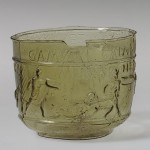
Beachcombing has never understood the irrational pleasure of glass. Holding a wine glass in our hands – whatever the content – is surely one of the house’s hidden joys and conversely having a chipped glass or one with any line of imperfection is strangely irritating. It was while contemplating one such imperfect glass yesterday in Beachcombing’s favourite […]
A Pillar and an Archer in Medieval Alexandria January 23, 2011
Author: Beach Combing | in : Ancient, Medieval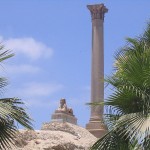
Ancient pillars survive even when associated buildings collapse. Many Greco-Roman pillars, indeed, are still standing today: a testimony to the durability of early Mediterranean civilisation. The medieval dwarfs looking back at the achievements of the classical world often got excited by pillars. Pillars were probably in part responsible for causing an early English poet […]
A Roman Werewolf and a Dinner Tale January 18, 2011
Author: Beach Combing | in : Ancient
Beachcombing still has the werewolf itch and it will not be exorcised unless he manages to spit out the story of Niceros the Freedman. The tale appears in Petronius’ Satyricon, the incomplete and bawdy Roman road novel that is best know today for its description of a Roman feast – where, in fact, this story is told. […]
Last Will and Testament of a Pig January 10, 2011
Author: Beach Combing | in : Ancient
Beachcombing ran across a curious little work today: the Testamentum Porcelli, Will of a Pig. It is possible that he read it many years ago because it seemed vaguely familiar: there is certainly something pleasingly grotesque in its words – a bit Roald Dahl – that brought Beachcombing back to his early 20s when Beach drank too […]
Calleva: the Last Romano-British City October 14, 2010
Author: Beach Combing | in : Ancient, Medieval
Beachcombing finishes, today, his rapid tour around bizarre or curious near-London and London sites: a work he has undertaken partly for Canadian History Student and partly out of nostalgia – he is in Italy at the moment. And what better place to end than Calleva Atrebatorum, the Woody Place of the Atrebates Tribe, way out […]
Going Dark Age on the Circle Line October 12, 2010
Author: Beach Combing | in : Medieval
Beachcombing’s trawl around south-east England and London on behalf of Canadian History Student is now three-days old and continues here with another side of London’s Circle Line. The Circle Line for any London virgins among Beachcombing’s readership is the wonderful series of station represented by a yellow circle on the map of central London that goes […]
Super-Centenarians in the Roman Empire September 23, 2010
Author: Beach Combing | in : Ancient
Beachcombing knew that life expectancy in the Roman Empire stood at between twenty and thirty years of age – a figure dragged down, of course, by appalling infant mortality. So he was particularly fascinated to come across this passage in Pliny the Elder. In addition there are the experiences of the last census, held within the […]
Ten Thousand Romans in Turkmenistan September 19, 2010
Author: Beach Combing | in : Ancient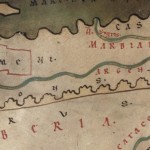
There are many reasons for which individuals have travelled a long way from home in history: money, love, fear… But a vitally important and generally overlooked motive is imprisonment. Soldiers taken in battle have often (and very sensibly) been moved from where they were captured to the furthest possible point from their own country to avoid […]


